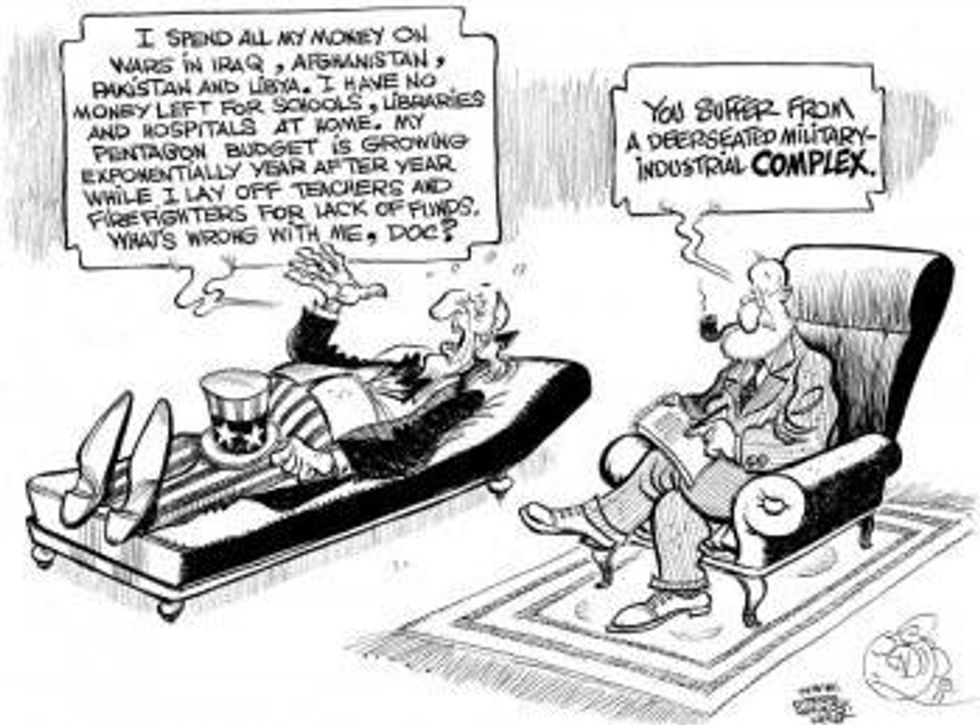Libya War Is No Pentagon Lifeline
Let's shrink our military footprint.
The United States is fighting another war--of unknown scope and length--in Libya. At a time of budget-cutting fever on Capitol Hill, the war represents a potential lifeline for the Pentagon. If you believe the Libya operation justifies current U.S. military spending levels--or even an increase--think again.
According to government estimates, we'll spend about $1 billion on the Libyan intervention over the course of a full year of operations. That's a lot of money if applied to low-income housing or job retraining. But it's chump change for the Pentagon.

President Barack Obama's proposed 2012 budget would give the Pentagon approximately $675 billion, including outlays for the wars in Afghanistan and Iraq. The cost of the war in Libya, in other words, is basically a rounding error in Pentagon spending. Indeed, the Libya operation represents only a little more than 1 percent of what the Pentagon wastes in its budget, which is $70 billion a year according to a recent Government Accountability Office audit.
Right or wrong, intervening in Libya won't break the bank. Yet the overall Pentagon budget threatens to do so, nationally and globally.
According to the latest figures from the Stockholm International Peace Research Institute, the United States was responsible for 94 percent of the global increase in military expenditures in 2010. Global spending on war, and the preparations for war, went up last year for the thirteenth year in row. The world now spends, by this conservative estimate, $1.63 trillion annually on the military.
We can defend ourselves and our allies, and still provide the military resources to implement UN Security Council resolutions, with a much smaller overall military footprint. The Sustainable Defense Task Force, convened by Barney Frank (D-MA), has outlined cuts totaling nearly $1 trillion over the next decade. None of the proposed cuts--whether reductions in the nuclear weapons program or eliminating unnecessary weapons systems like the overpriced Marine Expeditionary Fighting Vehicle--would hamper our nation's ability to counter terrorist threats or participate in multilateral campaigns to prevent genocide.
The military operation in Libya shouldn't be used to justify bloated U.S. military spending. Moreover, the conflict itself underscores the necessity of restraining the arms trade. Muammar Gaddafi is fighting the rebels not only with weapons he bought from the former Soviet Union, but also with planes from France, transport aircraft from the United States, and tanks from Great Britain--all countries now arrayed against the government in Tripoli.
The more weapons we build and sell, the more we will fight unnecessary wars or be tempted to use military force to stop them. We no longer have the luxury to indulge in such irrational budget choices. The United States and the world face enormous threats from climate change, global poverty, and nuclear proliferation. We can't address these threats and keep wasting money on excess military spending.
It's long past time for the international community, beginning with the United States, to move the money from military deeds to human needs so that we fight fewer wars--not more wars--in the future.
An Urgent Message From Our Co-Founder
Dear Common Dreams reader, The U.S. is on a fast track to authoritarianism like nothing I've ever seen. Meanwhile, corporate news outlets are utterly capitulating to Trump, twisting their coverage to avoid drawing his ire while lining up to stuff cash in his pockets. That's why I believe that Common Dreams is doing the best and most consequential reporting that we've ever done. Our small but mighty team is a progressive reporting powerhouse, covering the news every day that the corporate media never will. Our mission has always been simple: To inform. To inspire. And to ignite change for the common good. Now here's the key piece that I want all our readers to understand: None of this would be possible without your financial support. That's not just some fundraising cliche. It's the absolute and literal truth. We don't accept corporate advertising and never will. We don't have a paywall because we don't think people should be blocked from critical news based on their ability to pay. Everything we do is funded by the donations of readers like you. Will you donate now to help power the nonprofit, independent reporting of Common Dreams? Thank you for being a vital member of our community. Together, we can keep independent journalism alive when it’s needed most. - Craig Brown, Co-founder |
The United States is fighting another war--of unknown scope and length--in Libya. At a time of budget-cutting fever on Capitol Hill, the war represents a potential lifeline for the Pentagon. If you believe the Libya operation justifies current U.S. military spending levels--or even an increase--think again.
According to government estimates, we'll spend about $1 billion on the Libyan intervention over the course of a full year of operations. That's a lot of money if applied to low-income housing or job retraining. But it's chump change for the Pentagon.

President Barack Obama's proposed 2012 budget would give the Pentagon approximately $675 billion, including outlays for the wars in Afghanistan and Iraq. The cost of the war in Libya, in other words, is basically a rounding error in Pentagon spending. Indeed, the Libya operation represents only a little more than 1 percent of what the Pentagon wastes in its budget, which is $70 billion a year according to a recent Government Accountability Office audit.
Right or wrong, intervening in Libya won't break the bank. Yet the overall Pentagon budget threatens to do so, nationally and globally.
According to the latest figures from the Stockholm International Peace Research Institute, the United States was responsible for 94 percent of the global increase in military expenditures in 2010. Global spending on war, and the preparations for war, went up last year for the thirteenth year in row. The world now spends, by this conservative estimate, $1.63 trillion annually on the military.
We can defend ourselves and our allies, and still provide the military resources to implement UN Security Council resolutions, with a much smaller overall military footprint. The Sustainable Defense Task Force, convened by Barney Frank (D-MA), has outlined cuts totaling nearly $1 trillion over the next decade. None of the proposed cuts--whether reductions in the nuclear weapons program or eliminating unnecessary weapons systems like the overpriced Marine Expeditionary Fighting Vehicle--would hamper our nation's ability to counter terrorist threats or participate in multilateral campaigns to prevent genocide.
The military operation in Libya shouldn't be used to justify bloated U.S. military spending. Moreover, the conflict itself underscores the necessity of restraining the arms trade. Muammar Gaddafi is fighting the rebels not only with weapons he bought from the former Soviet Union, but also with planes from France, transport aircraft from the United States, and tanks from Great Britain--all countries now arrayed against the government in Tripoli.
The more weapons we build and sell, the more we will fight unnecessary wars or be tempted to use military force to stop them. We no longer have the luxury to indulge in such irrational budget choices. The United States and the world face enormous threats from climate change, global poverty, and nuclear proliferation. We can't address these threats and keep wasting money on excess military spending.
It's long past time for the international community, beginning with the United States, to move the money from military deeds to human needs so that we fight fewer wars--not more wars--in the future.
The United States is fighting another war--of unknown scope and length--in Libya. At a time of budget-cutting fever on Capitol Hill, the war represents a potential lifeline for the Pentagon. If you believe the Libya operation justifies current U.S. military spending levels--or even an increase--think again.
According to government estimates, we'll spend about $1 billion on the Libyan intervention over the course of a full year of operations. That's a lot of money if applied to low-income housing or job retraining. But it's chump change for the Pentagon.

President Barack Obama's proposed 2012 budget would give the Pentagon approximately $675 billion, including outlays for the wars in Afghanistan and Iraq. The cost of the war in Libya, in other words, is basically a rounding error in Pentagon spending. Indeed, the Libya operation represents only a little more than 1 percent of what the Pentagon wastes in its budget, which is $70 billion a year according to a recent Government Accountability Office audit.
Right or wrong, intervening in Libya won't break the bank. Yet the overall Pentagon budget threatens to do so, nationally and globally.
According to the latest figures from the Stockholm International Peace Research Institute, the United States was responsible for 94 percent of the global increase in military expenditures in 2010. Global spending on war, and the preparations for war, went up last year for the thirteenth year in row. The world now spends, by this conservative estimate, $1.63 trillion annually on the military.
We can defend ourselves and our allies, and still provide the military resources to implement UN Security Council resolutions, with a much smaller overall military footprint. The Sustainable Defense Task Force, convened by Barney Frank (D-MA), has outlined cuts totaling nearly $1 trillion over the next decade. None of the proposed cuts--whether reductions in the nuclear weapons program or eliminating unnecessary weapons systems like the overpriced Marine Expeditionary Fighting Vehicle--would hamper our nation's ability to counter terrorist threats or participate in multilateral campaigns to prevent genocide.
The military operation in Libya shouldn't be used to justify bloated U.S. military spending. Moreover, the conflict itself underscores the necessity of restraining the arms trade. Muammar Gaddafi is fighting the rebels not only with weapons he bought from the former Soviet Union, but also with planes from France, transport aircraft from the United States, and tanks from Great Britain--all countries now arrayed against the government in Tripoli.
The more weapons we build and sell, the more we will fight unnecessary wars or be tempted to use military force to stop them. We no longer have the luxury to indulge in such irrational budget choices. The United States and the world face enormous threats from climate change, global poverty, and nuclear proliferation. We can't address these threats and keep wasting money on excess military spending.
It's long past time for the international community, beginning with the United States, to move the money from military deeds to human needs so that we fight fewer wars--not more wars--in the future.

